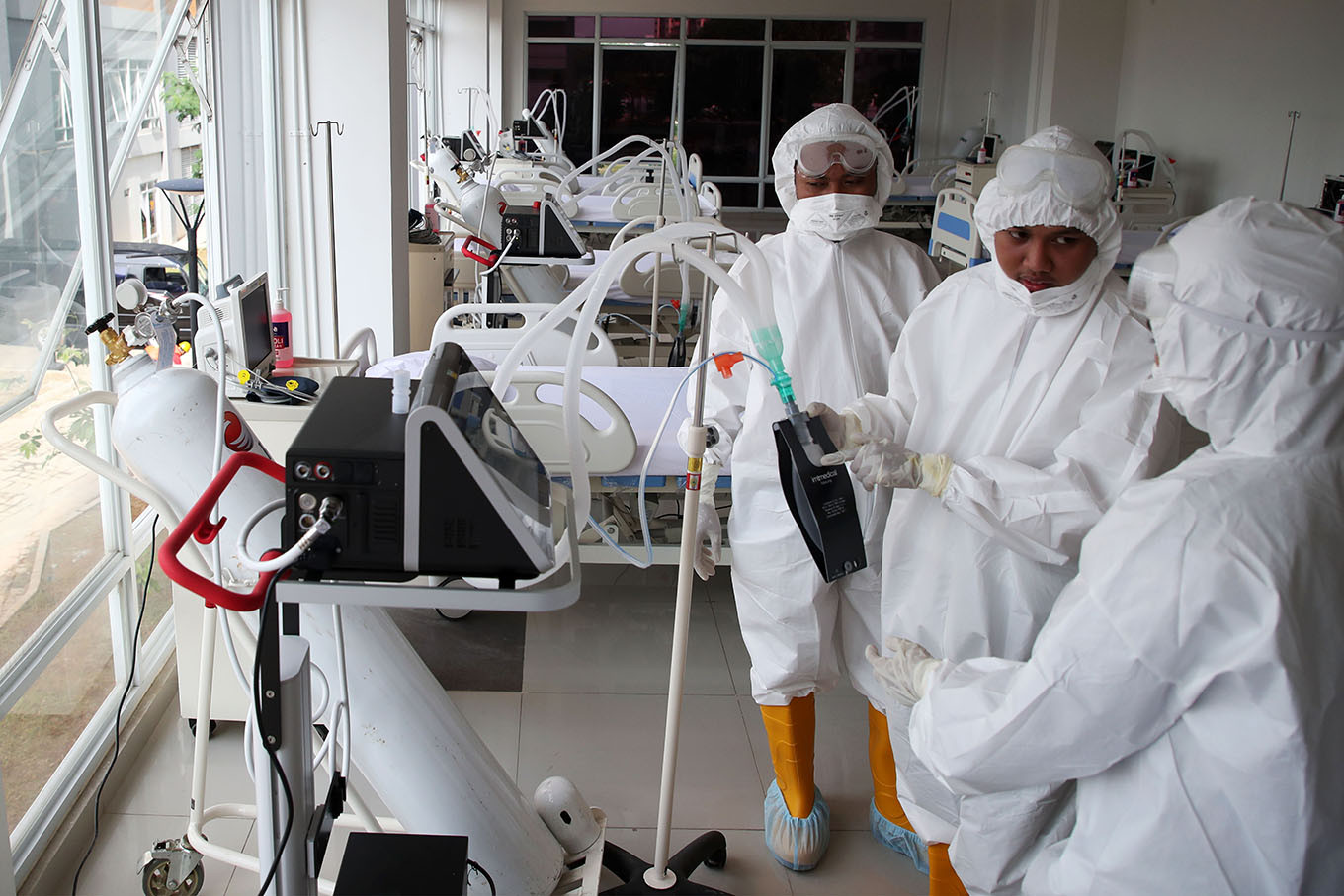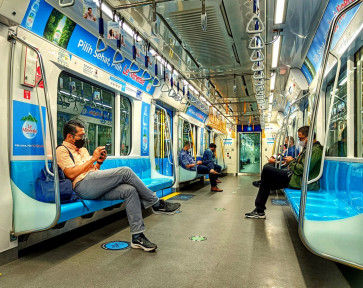Popular Reads
Top Results
Can't find what you're looking for?
View all search resultsPopular Reads
Top Results
Can't find what you're looking for?
View all search resultsJakarta sees rising COVID-19 hospitalizations
Medical workers in Jakarta are concerned about the increasing bed occupancy rates in the city’s hospitals and the increasing number of COVID-19 cases, with the capital extending on Thursday its transitional period of large-scale social restrictions (PSBB) for another two weeks.
Change text size
Gift Premium Articles
to Anyone
Medical workers in Jakarta are concerned about the increasing bed occupancy rates in the city’s hospitals and the increasing number of COVID-19 cases, with the capital extending on Thursday its transitional period of large-scale social restrictions (PSBB) for another two weeks.
The latest World Health Organization's (WHO) situation report on Indonesia, using Jakarta's data, showed that as of July 26 the city's bed occupancy rate – the number of people hospitalized with confirmed or suspected cases of COVID-19 divided by the number of isolation beds – stood at 66.9 percent.
The report said that since the beginning of June, the number of people hospitalized with confirmed cases had gradually decreased until July 7, when it reached around 400 hospitalizations. But starting July 8, "the number has progressively increased and is still increasing as of 26 July", when it almost reached 1,600. The WHO excluded data from the national makeshift Wisma Atlet COVID-19 hospital in Jakarta.
Sulianti Saroso Infectious Diseases Hospital (RSPI Sulianti Saroso), one of the COVID-19 referral hospitals reserved for severe cases, for instance, is currently treating 38 patients, up from between 26 and 30 patients during the early days of the outbreak, according to president director Mohammad Syahril. The ICU is also now full, but numbers are still manageable, he said.
Jakarta has appointed 67 referral hospitals that have a combined 4,556 isolation beds and 659 intensive care unit (ICU) beds, excluding the Wisma Atlet hospital. The city’s bed capacity, according to Governor Anies Baswedan, had been improvement since the outbreak first hit the city and would suffice as it began loosening restrictions. The city started its first phase of transitioning from PSBB measures on June 5, before extending the transition period for a second time last Thursday after increasing numbers of cases were recorded.
Read also: Jakarta still struggles with virus despite improved health facilities
Anies said on July 24 that the occupancy rate for isolation beds in Jakarta stood at 44 percent, while for ICU beds the rate was 32 percent. The figures mark an increase from the previous week, which saw the occupancy rate for isolation beds at 42 percent and intensive care beds at 25 percent. Anies, at the time, said there was "not any significant increase" and that the figures were still safe given they were "less than half of the capacity specifically prepared for COVID-19". However, he warned against complacency.
Jakarta recorded 374 new cases, 679 new recoveries and 16 new fatalities on Saturday, bringing the total number of confirmed cases to 21,575 with 6,836 active cases and 852 deaths. The data also showed that about half of the confirmed cases were asymptomatic, 33 percent were symptomatic and the remaining unidentified.
As of Saturday, 2,153 people had been hospitalized with confirmed cases, while 1,656 people with suspected cases had been isolated at hospitals.
A nurse at a state referral hospital for severe COVID-19 cases, who wished to remain anonymous, said on Thursday that while her hospital was now more prepared to handle COVID-19 patients, the increasing number of patients could not help but worry her. She said that six patients in the hospital's emergency unit were waiting to be transferred to unoccupied beds in the negative-pressure isolation rooms.
"I hope people will follow health protocols during their daily activities because it depends on the individuals now. Some people will underestimate the virus as long as they and their family members are not the ones infected. [...] It's tiresome having to work in a hazmat suit for hours on end," she said.
A doctor at another state referral hospital said her hospital had recently seen an increase in COVID-19 patients, although the number was still within its capacity. She said she was worried that Jakarta hospitals might return to being overwhelmed, as was common prior to beginning of the pandemic, after hospitals saw a notable decline in patients during the PSBB period.
Doddy, a doctor at another referral hospital who requested to be identified only by his first name, said his hospital had seen an increase in patients since the beginning of July, with some 90 percent of some 150 beds having been occupied. As a result, he said, community health centers (Puskesmas) and non-referral hospitals would have a hard time referring patients to his hospital.
Referring patients with mild cases to the Wisma Atlet hospital could sometimes be difficult given the requirements regarding patients' conditions, he said, adding that to send patients to other referral hospitals, officials at his hospital would have to use their own channels and reach out to colleagues at other hospitals.
"I don't think we at the hospital will be as overwhelmed as at the beginning of the pandemic, because it's gotten easier now with clearly-set protocols and systems,” Doddy said. “But what I'm most worried about is that while more cases are being detected, the capacity of healthcare facilities has stayed the same. It'll be a problem for patients who can't get a bed at a hospital, especially those who can't afford to isolate at home.”
He urged authorities to more strictly enforce punishments for protocol violations, especially in the business sector.
The Jakarta Health Agency did not immediately respond to a request for comment.
Jakarta’s positivity rate – the percentage of positive results from all tests – hit 6.5 percent in the past week, above the figure of 5 percent or below recommended by the WHO for relaxation of restrictions.
Furthermore, the city's latest COVID-19 daily reproduction number (Rt) stood at 1, while an outbreak can only be considered under control if the number is below 1, Anies said while announcing the extension of restrictions last week.










